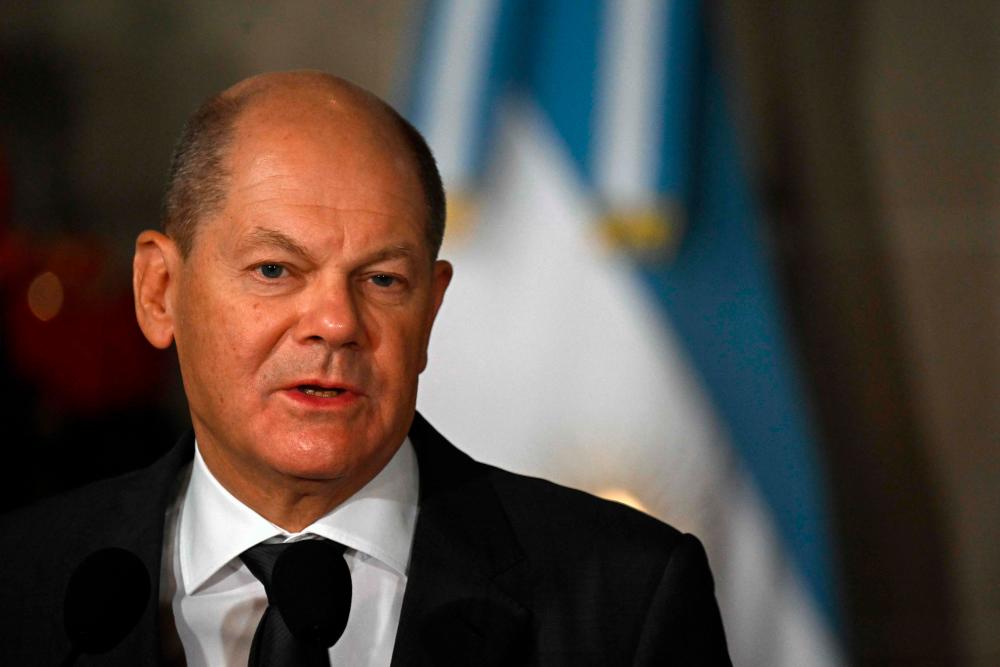BUENOS AIRES: German Chancellor Olaf Scholz travels to Chile on Sunday, part of a Latin America tour that also includes Argentina and Brazil, where Berlin and the EU are seeking a reset following the election of Luiz Inacio Lula da Silva.
Accompanied by a delegation of business leaders, Scholz arrived at his first stop, Buenos Aires, on Saturday and met with President Alberto Fernandez.
The two leaders affirmed the importance of concluding a trade agreement between the EU and trade bloc Mercosur, comprised of Argentina, Brazil, Paraguay and Uruguay.
“We agree to deepen bilateral trade relations and for this the EU-Mercosur agreement is of special importance,“ Scholz told reporters after the meeting. “Our goal is to reach a quick conclusion.”
With Lula’s inauguration to the presidency earlier this month in Brazil, “we are in a better position” to reach an agreement, Fernandez said.
Germany wants to boost cooperation with Latin America and the Caribbean on “renewable energies, green hydrogen and responsible trade in raw materials,“ Scholz said in an interview Saturday with the Grupo de Diarios America (GDA) consortium of South American newspapers.
The visit comes as German business seeks new opportunities overseas following the economic shock caused by Russia's invasion of Ukraine, and as concerns grow about a heavy reliance on China.
All three countries -- Argentina, Chile and Brazil -- are rich in natural resources and “very interesting partners” for Europe’s top economy, a government source in Berlin said. But the Brazilian leg of the trip will be the most closely watched.
Germany, and more broadly the European Union, are seeking to reset relations now that Lula is back in power, following the divisive administration of far-right leader Jair Bolsonaro.
On Monday, Scholz will become the first Western leader to meet with Lula since his inauguration.
He will first meet on Sunday, however, with Chilean President Gabriel Boric and visit the Museum of Memory and Human Rights commemorating the atrocities committed during the dictatorship of Augusto Pinochet from 1973 to 1990.
EU-Mercosur deal
Although a deal was reached with Mercosur in 2019 following 20 years of talks, it has not yet been ratified, and has faced a wave of criticism in Europe, particularly among the agriculture and ecological sectors.
This week however, Lula signaled a renewed focus on finalizing the accord, saying it was “urgent and extremely important” to reach agreement.
“We heartily support the efforts of the European Commission regarding the swift reaching of an accord with the Mercosur partners,“ said Scholz in his GDA interview.
Ahead of the trip, Germany’s powerful machine tool makers’ federation called for the deal “to finally be implemented after years of going nowhere.”
“Time is pressing,“ the federation said.
Germany will also be trying to ensure it does not lose ground to China, which is increasingly becoming a trade rival for European powers and the United States in Latin America.
Protecting forests
The environment will be high on the agenda when Scholz visits Brazil.
After Lula's election victory in October, Berlin said it was ready to resume payments to a fund that aims to protect the Amazon rainforest.
Germany, along with the fund's biggest donor Norway, had halted payments after deforestation surged under climate-sceptic Bolsonaro.
Bolsonaro’s administration caused “a rupture in Brazilian environmental policy and closed the doors of environmental diplomacy,“ said Roberto Goulart Menezes, of the Institute of International Relations at the University of Brasilia.
“Lula’s government, on the contrary, is resuming this agenda and placing it among its priorities.”
As Russia's war against Ukraine grinds on, Germany will seek to use the Latin American tour to drum up further international support against Moscow, the Berlin government source said.
Argentina, Chile and Brazil have criticized the invasion of Ukraine at the United Nations but have not adopted sanctions against Moscow.
Lula caused shock last year when he said Ukrainian President Volodymyr Zelensky was “as responsible as” Russian President Vladimir Putin for the conflict.
“We will underline that the contours of peace are relatively simple -- that Russia leaves a territory where it has no business,“ the German source said. - AFP













